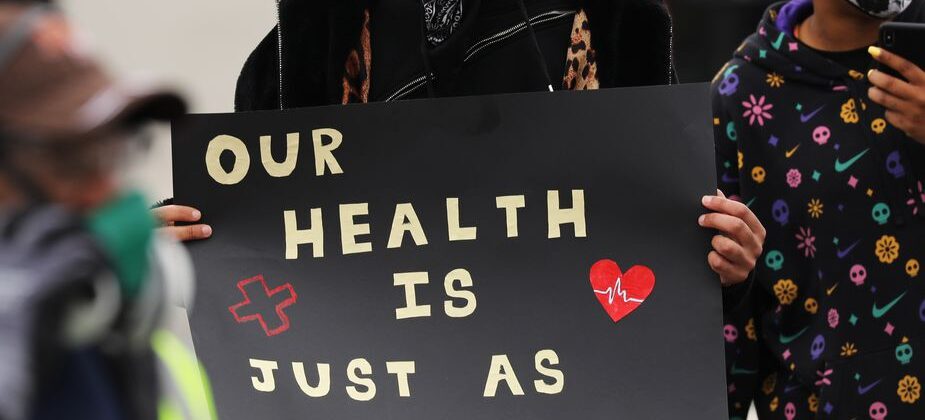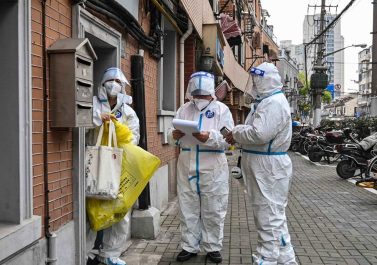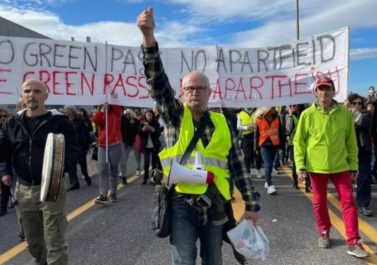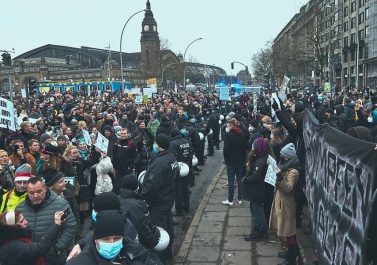A short summary of global Covid-19 struggles – 1st to 14th April 2020
First off, we have to admit the rather random character of such summaries, as the amount of strikes, riots, protests has been massive. Rather than pretending to present a complete picture, we want to make a few points, illustrated by examples. We call internationalist comrades to take part in our collective effort to share information about these struggles – beyond the headlines – in order to be able to support them:
www.feverstruggle.net
1) The ruling class knows what’s at stake
In a Bloomberg article, a commentator alleges that the current peak-period of the Covid-19 pandemic might see a temporary lull in protests in regions which have witnessed fierce protest movements (Sudan, Chile, Iraq, etc.). After this lull the economic impact of the pandemic, which, according to the ILO will result in severe cuts in the income of 1.25 billion people, will intensify and spread these class movements. [1] We can see a slow shift in the state’s reaction from the ‘containment of Corona’ to the ‘containment of unrest’, e.g. when the Italian state sent troops to the south of the country fearing mass looting [2], or the Portugese state banning strikes as part of the emergency measures. [3] The government in France and Germany changed the law to allow the extension of the working week in the so-called ‘key sectors’ from 48 to 60 hours. In Brazil the state allows companies to reduce working hours and wages by 50%. [4] In central sectors like agriculture the state takes over the supply-management and social quarantine of labour power, by recruiting additional seasonal migrant workers, such as in the case of Germany and Italy [5]; by considering the recruitment of students and laid off workers in the UK for agricultural work [6]; or considering state-sanctioned wage cuts in the USA [7]. State measures and the bosses’ reactions have already led to an increase in disputes with agricultural workers, such as in Italy and Spain. [8]
2) Strikes of industrial workers are at the forefront of collective working class reactions to Covid-19
The most crucial revelation of the Covid-19 crisis is the fact that we don’t live in a ‘post-industrial’ society, dominated by ‘immaterial labour’. Nor that strikes, as a collective weapon of workers, are a relic of the past. Most of the collective reactions of workers to the crisis were strikes by largely manual workers in the essential industries. Initially these strikes were mainly about the lack of health and safety. In the last two weeks we saw strikes of waste and waste water workers in France, the UK and the USA [9]; wildcat strikes at the Royal Mail in the UK [10]; walk-outs of more than 10,000 construction workers in the USA [11]; strikes in packaging plants in France [12]; supermarket workers in Brazil and the USA [13]; Amazon workers in the USA, following France and Spain [14]; automobile workers in the supply-chain in the USA [15]; food processing and fast food workers in the USA and wildcat strike/mass sick leave in the UK. [16] At the centre of these strikes were hospital and care workers, who went on strike in the USA, India, Pakistan, Russia and Greece. [17] These strikes happen on top of a high rate of absenteeism, e.g. in Germany the cleaning sector and in the UK the food processing sector reported sick rates of up to 40%.
3) Some of the strikes moved from reactions in individual companies to joint company actions, independent from the union apparatus
Here the main examples are strikes in the automobile sector in Mexico, which took on a mass scale [18]; another example were spreading strikes in call centres in Brazil [19]; but we also saw smaller ‘spontaneous’ infections, e.g. in the case of workers of two separate companies walking out in Illinois, USA. [20] These organic expansions of strikes will create important links for the disputes to come.
4) Some of the strikes go beyond the initial and immediate demand for health and safety and address the question of wider control
In Detroit, hospital workers protested against the management’s planned decision to close down an emergency department in a poorer part of town, also given that most victims of Covid-19 in the US are poor, working class people. [21] In Chicago, nurses refused to work unless management would hire more workers. [22] Earlier on General Electrics workers in the USA, who normally produce jet engines, protested and demanded to shift production to medical equipment. [23] In Marseille workers at McDonalds transformed the fast-food restaurant into a food distribution hub for the local working class area. [24] These are real experiences where workers question the usual and most fundamental power structures. The ‘return to work’ will be the next point of contention, and we can already see how bosses and unions try to manage this conflict-prone issue, e.g. in the case of an agreement between FIAT and the unions in Italy to get people back to work. [25]
5) Some of the strikes happened in a wider social environment which will risk the stability of the political regime
Here we saw strikes in the mining sector in Iran [26]; textile workers in Myanmar [27]; textile and electronics workers in Turkey (who also beat up their bosses). [28] It is not unlikely that the economic fall out of the Corona crisis in combination with such strikes will rattle those regimes who have been under fire recently anyway.
6) Strikes will increasingly move from the ‘health and safety’ issue to the issue of wages
We heard in the news that many companies are failing to pay full wages to workers and that, for example, 30% of workers in the USA and Canada are falling behind when it comes to rent payments. [29] The question of (outstanding) wages will become more central in the coming weeks and we can see first glimpses of this in recent dock workers’ strikes in China [30] and factory workers in Argentina. [31] The company’s ‘means of production’ will become workers’ main collective asset in order to enforce wage payments. This may include workers who might not be directly employed by the company. Here, one focus will be wages, another the question of housing, as we see an increase in squatting, e.g. in this case in Santa Cruz [32] and by domestic servants in Delhi [33], who take over their bosses’ empty apartments.
7) Workers in the informal sector confront the ‘lockdown regime’ and the mafia-state moves in
We can see a certain division appearing in the form and target of struggles depending on whether workers are directly employed or whether they depend on the informal sector, such as street markets or small enterprises. In the latter case, the state and the police which enforce the lockdown become the target, as ‘lockdown’ means no income for these workers. Here we’ve seen riots by informal migrant workers in Surat, India [34], proletarian youth in Iraq [35], or protests of market stall workers in Kenya. [36] Police brutality against marginal workers increases also in the western countries, e.g. the police killed young proletarians in Beziers, France [37] and Anderlecht, Belgium [38], which caused riots in the latter case. Here we can also see a division of labour emerging between the official state force, which aims at general ‘law and order’, and the mafia-state, which takes over basic welfare functions and tries to expand its influence within the lower sections of the working class, such as in Italy and Mexico. [39] Here ‘looting’ and collective reduction of prices alone, like what happened in Honduras [40], will not be a sufficient response to lack of food and state violence. Still, the recent wave of prison mutinies, from the USA, Argentina, Lebanon, Iran, Mexico to Russia show that the repressive arm of the system is fragile. [41]
8) We need a debate about working class strategy under the current circumstances
As a political collective, AngryWorkers encourages a collective debate about ‘revolutionary strategy’, which addresses the main questions current struggles throw up: how can the struggles within the essential sectors extend their scope along the global supply-chains that they are part of? How can struggles in the essential sectors address the material needs of marginal sections of the working class? How can regional differences and divisions imposed not only by state borders, but by different levels of development be overcome? We wrote a working paper for the discussion and propose to debate the paper in confrontation with the actual struggles we currently see.
————
[1]
https://www.bloomberg.com/opinion/articles/2020-04-11/coronavirus-this-pandemic-will-lead-to-social-revolutions
[2]
https://www.wsws.org/en/articles/2020/04/06/ital-a06.html
[3]
https://www.marxist.com/coronavirus-shatters-illusory-portuguese-boom.htm
[4]
https://www.wsws.org/en/articles/2020/03/20/braz-m20.html
[5]
The Italian government wants to recruit 100.000 seasonal workers from Romania for the spring harvest, but defined itself as 'unsafe port of entry' in order to be able to reject refugees https://t.co/QXOK5K4rwt
— AngryWorkers (@WorkersAngry) April 9, 2020
Crowded conditions for seasonal agricultural workers from Romania who have been recruited to work in the asparagus harvest in Germany https://t.co/hlCzcaen9P
— AngryWorkers (@WorkersAngry) April 12, 2020
[6]
Huffington Post is reporting a soon to be announced government scheme to recruit furloughed workers and students to take up short term seasonal work picking fruit and veg to cover a shortage of Eastern European migrants. https://t.co/a3cMEKtgJY
— Artificial Inelegance (@MediocreDave) April 10, 2020
[7]
https://www.npr.org/2020/04/10/832076074/white-house-seeks-to-lower-farmworker-pay-to-help-agriculture-industry?t=1586761968886
[8]
Interview with Andalusian agricultural workers union SAT about the impact of covid-19 on local workers https://t.co/zsCfk2HyR2
— AngryWorkers (@WorkersAngry) April 10, 2020
Conflict between migrant agricultural workers and local authorities in Calabria. Workers demand indefinite residency rights and protection against the crisis caused by Corona… https://t.co/Bw2Mep8a0F
— AngryWorkers (@WorkersAngry) April 1, 2020
[9]
https://www.wmar2news.com/news/coronavirus/wastewater-workers-walkout-claim-unsafe-conditions
https://www.ouest-france.fr/nouvelle-aquitaine/poitiers-86000/poitiers-les-eboueurs-en-greve-pour-denoncer-leurs-conditions-de-travail-6805115
https://www.bbc.co.uk/news/uk-england-merseyside-52200995
[10]
"Royal Mail workers walked out after bosses refused to clean the workstation of a colleague who had been hospitalised" https://t.co/hnLlSHnCYH
— Shelly Asquith (@ShellyAsquith) April 9, 2020
#NSSN sends #solidarity to members of @CWUnews at Hedge End DO – forced to take action to make the workplace safe for #RoyalMail workers #Cononavirus #COVID19 @CWU_WSCB #Renationalise Royal Mail pic.twitter.com/hqWwIuVxN9
— NSSN (@NSSN_AntiCuts) April 2, 2020
[11]
Massive wildcat of 13,000 carpenters threatened in Massachusetts #globalstrike #generalstrike #GeneralStrike2020 https://t.co/v2MifAO3MM
— Robert Ovetz (@OvetzRobert) April 4, 2020
[12]
Report on how bosses reacted to strike threat in paper mill in France https://t.co/LwqMGe9sbW
— AngryWorkers (@WorkersAngry) April 11, 2020
[13]
[REPORTS] Brazil: Supermarket Workers Walkout in Minas Geraishttps://t.co/t4dWzS1t2f pic.twitter.com/xYTmHJU6cz
— Fever (@Feverstruggles) April 8, 2020
Whole Foods workers walked out in 5 states. #generalstrike #globalstrike https://t.co/p2MznNCuE5 via @technology
— Robert Ovetz (@OvetzRobert) April 8, 2020
[14]
I interviewed Chris Smalls, who was recently fired by Amazon for organizing a walkout.
"These billionaires should be ashamed of themselves."#COVID2019 #AmazonStrike #ChrisSmallshttps://t.co/R5xmf33H7h
— Teddie (@TeddieRedder) April 8, 2020
This is Strike #3 that we had at Amazon DCH1 https://t.co/Le1ZMJrHTE
— Amazonians United Chicagoland (@AUchicagoland) April 6, 2020
[15]
Union members at a Detroit-area auto parts plant refused to work March 19 and 20 after learning that a management employee had tested positive for the coronavirus. Angry first-shift workers gathered outside the plant and refused to enter.https://t.co/kr0zd7yvCG
— Labor Notes (@labornotes) April 3, 2020
[16]
https://www.bloomberg.com/news/articles/2020-04-01/under-siege-from-virus-meat-workers-want-more-safety-measures
https://twitter.com/contre_capital/status/1248499743182827524
Arbeiter*innen bei Domino's Pizza @dominos in #LosAngeles im #Streik, nachdem vier von ihnen #COVID-19 positiv getestet wurden. Sie haben auch die Gesundheitsbehörde informiert und diese aufgefordert, die Filiale zu schließen. Zur Nachahmung empfohlen! #ProletarischerSelbstschutz https://t.co/7Be0t1sJon
— FAU | Freie Arbeiter*innen Union 👉 @FAU@todon.eu (@FAUGewerkschaft) April 12, 2020
Slaughterhouse factory workers wildcat at factories in Virginia and Illinois. #generalstrike #globalstrike #coronastrike https://t.co/TVWuFkBJd9
— Robert Ovetz (@OvetzRobert) April 4, 2020
https://www.devonlive.com/news/devon-news/devon-2-sisters-factory-hit-4028476
https://angryworkersworld.wordpress.com/2020/04/13/workers-act-now-or-pay-later-tune-in-and-sick-out/
[17]
Nursing home nurses & staff launch wildcat strike at Pennsylvania nursing home after hospital industry kills protections in federal bailout bill. #generalstrike #globalstrike #coronastrike https://t.co/KAOWksu4tj
— Robert Ovetz (@OvetzRobert) April 2, 2020
19,000 ambulance workers in Uttar Pradesh, India on strike, they haven't been paid for 2 months and don't receive the right protectionhttps://t.co/JOcvGa2lpqकोविड-19-महामारी-के-चलते-मजद/
— AngryWorkers (@WorkersAngry) April 1, 2020
Police brutally attacked several hundred medical staff after they marched to the house of the Balochistan Chief Minister in Quetta to protest the lack of personal protective equipment or PPE.https://t.co/yoaLZKtI4P
— World Socialist Web Site (@WSWS_Updates) April 9, 2020
Athens, Greece: Police deployment at Evangelismo hospital during a protest of hospital workers for better health and safety https://t.co/Jj1zwb9ESI
— AngryWorkers (@WorkersAngry) April 7, 2020
Russian doctors, nurses protest against horrifying conditions in hospitals: “We have taken this step because we fear for our health and for the health of the patients of the unit.” #CoronavirusRussia #PPEShortage #COVID19https://t.co/RapLAZvhLg
— World Socialist Web Site (@WSWS_Updates) April 5, 2020
[18]
“The companies and trade unions kill the working class.”
One year on from 70,000 strong maquiladora strike thousands walk out as government allows corporations to continue production through #covid19 pandemic.https://t.co/XQN1hDQSQU
— World Socialist Web Site (@WSWS_Updates) April 7, 2020
[19]
https://feverstruggle.net/2020/04/02/call-center-brazil/
[20]
https://twitter.com/contre_capital/status/1247431131760336897
[21]
https://labornotes.org/blogs/2020/04/why-are-they-shutting-down-chicago-emergency-room-during-pandemic
[22]
Nurses at a Detroit hospital refused to start their shift for four hours due to having to manage more than 20 critically ill patients each. Instead of bringing in extra help, the hospital sent them home.https://t.co/PbmTfeeNyV
— libcom.org (@libcomorg) April 7, 2020
[23]
https://www.vice.com/en_us/article/y3mjxg/general-electric-workers-walk-off-the-job-demand-to-make-ventilators
[24]
https://www.revolutionpermanente.fr/Un-McDo-marseillais-requisitionne-par-les-travailleurs-pour-donner-de-la-nourriture-dans-les
[25]
Fuck that… https://t.co/tGUXXgF72O
— AngryWorkers (@WorkersAngry) April 10, 2020
[26]
3,500 iron ore miners launched a wildcat strike during the pandemic in the southeastern province of Kerman in Iran in mid March. #generalstrike #globalstrike https://t.co/UyMJOpjw5X
— Robert Ovetz (@OvetzRobert) April 5, 2020
[27]
https://twitter.com/contre_capital/status/1246515090339307521
[28]
Workers at Akar Tekstil factory in Turkey stopped work spontaneously and attacked the boss with clubs – after he endangered their lives during the Corona pandemic https://t.co/JaqgFULxKn
— AngryWorkers (@WorkersAngry) April 4, 2020
More footage from the strike at the electronics factory in Turkey https://t.co/5jf5UKzzSy
— AngryWorkers (@WorkersAngry) April 2, 2020
[29]
https://twitter.com/colefwebber/status/1247895410544267270
69 percent of households had paid their rent by April 5; this compares to 81 percent that had paid by March 5, 2020, and 82 percent that had paid by the same time last year.
30% of Americans are behind on rent v. 20 % normally! https://t.co/wGoelcRx2C pic.twitter.com/zuUa40fdbq— Adam Tooze (@adam_tooze) April 9, 2020
[30]
China. Dock workers of the port in Zhanjiang block the roads to demand outstanding wages, while the union officials advised them to refrain from the action https://t.co/t2Q2wVq7rT
— AngryWorkers (@WorkersAngry) April 2, 2020
[31]
#Argentina: Police crackdown on Frigorífico Penta workers in Quilmes. They were protesting the closure of the company, and demanded their March salaries.
Video via @FORA_CAPITAL https://t.co/hDcWfmra12— Persona (@PersonalEscrito) April 9, 2020
[32]
A family w/ children was squatting an abandoned house in #SantaCruz. A realtor arrived, then 12+ cops came and arrested the family. 1/3 pic.twitter.com/qAe6g9G4hK
— Santa Cruz Indymedia (@scimc) April 12, 2020
[33]
This text reports about empty apartments in South Delhi having being taken over by the servants. Would be interesting to know more about this, as the (private) security apparatus is massive and the police pretty brutal when it comes to these type of 'personal transgressions'… https://t.co/R2SEMAXeJ8
— AngryWorkers (@WorkersAngry) April 9, 2020
[34]
https://twitter.com/contre_capital/status/1248871874953691138
[35]
https://twitter.com/WorkersIraq/status/1247843329380954112
End the curfew on 11.4 or pay us!
workers' families in Nasiriyah south of Iraq protesting, these workers live day by day and they have no financial income from the government,and until now the government has not paid them any wages that help them staying at home!#COVID19Pandemic pic.twitter.com/9Drcf3lgps— workers against sectarianism (@WorkersIraq) April 2, 2020
The workers inside Altahreer square sit-in produced 6000 Medical mask and distributed it to the hospitals in #Baghdad .
.#عمال_ضد_الطائفية #WAS#Conte #bigbrother2020 #Conte pic.twitter.com/MugW5Jgeb3— workers against sectarianism (@WorkersIraq) April 6, 2020
[36]
Kenya, the police shoots teargas at farmers to close a market. One man: "Hunger kills you in seven days, Corona in fourteen." https://t.co/FtKxbWhT30
— AngryWorkers (@WorkersAngry) April 1, 2020
[37]
Cops in France kill Mohammed Helmi Gabsi during dispute whether or not he complied with the Corona lockdown https://t.co/IGUBuPKhD4
— AngryWorkers (@WorkersAngry) April 11, 2020
[38]
Cops in France kill Mohammed Helmi Gabsi during dispute whether or not he complied with the Corona lockdown https://t.co/IGUBuPKhD4
— AngryWorkers (@WorkersAngry) April 11, 2020
[39]
Mafia distributes food to Italy's struggling residents https://t.co/GWvbKRarUS So have Los Viagras in Mexico & others.Criminal groups will build political capital from #COVID19. I & @DrPablo Wise anticipated in https://t.co/W0zo8Yxn5K https://t.co/cGRweOQK5s via @BrookingsInst
— Vanda Felbab-Brown (@VFelbabBrown) April 11, 2020
[40]
Honduras: révoltes de la faim suite au confinement. Barricades et autoréduction collective d'un supermarché à Choloma, la nourriture promise par le gouvernement n'arrivant pas. D'autres villes en révolte: San Pedro Sula, Tegucigalpa, Comayaguela…https://t.co/NwGk2fWm6j pic.twitter.com/KVdD8iQ9hp
— Ter-Ter et Liberté (@TerTerEtLiberte) April 11, 2020
[41]
https://www.theguardian.com/us-news/2020/apr/10/us-prisons-coronavirus-uprising-riot
WSP: Inmates set fires during 'disturbance' at Monroe Corrections Complex https://t.co/8kewtHQbsN
— KING 5 News (@KING5Seattle) April 9, 2020
https://twitter.com/enough14/status/1248613445752123393
Prison mutiny in Argentina, about lack of hygiene and covid-19 protection (and, beyond the health and safety aspect, about being locked up)… https://t.co/CE0FQ4msFT
— AngryWorkers (@WorkersAngry) April 9, 2020
PRison riots in Libya, near Tripoli https://t.co/jD5R8zhlA3
— AngryWorkers (@WorkersAngry) April 10, 2020
Turkey, prison revolt in Batman https://t.co/ghcHC5xWN8
— AngryWorkers (@WorkersAngry) April 5, 2020
Migrant protests in Mexico against lack of health and safety https://t.co/vxnfMDgLiV
— AngryWorkers (@WorkersAngry) April 4, 2020
Riot in maximum security prison in Irkutsk, Russia. Prison facilities torched in response to systematic maltreatment and new COVID related restrictions pic.twitter.com/gGeRBDceYo
— Vitalist International (@VitalistInt) April 11, 2020



